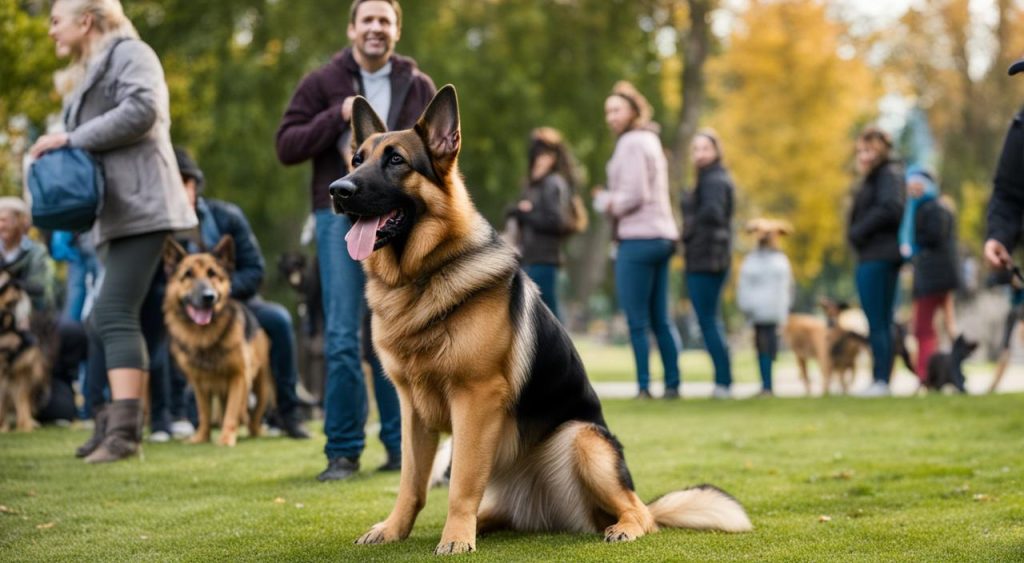German Shepherds are intelligent and loyal dogs, but their behavior around strangers can sometimes be cautious. While they are affectionate and loving toward their families, their protective nature can make them wary of unfamiliar faces. This behavior is rooted in their history as herding and guard dogs. However, with proper training and socialization, German Shepherds can become friendly and welcoming toward strangers.
Early socialization and exposure to different people and environments play a crucial role in shaping a German Shepherd’s behavior. By introducing them to a variety of individuals from a young age, you can help them develop the skills needed to be respectful and accepting of strangers. This makes German Shepherds suitable for homes with children and the elderly, as their friendly nature can create a safe and welcoming environment.
Key Takeaways:
- German Shepherds can be cautious around strangers due to their protective instinct.
- Proper training and socialization from a young age can help German Shepherds become friendly toward strangers.
- Early exposure to diverse environments and different people is crucial in shaping German Shepherd behavior.
- German Shepherds can be great companions for families as they can be both protective and welcoming.
- Understanding individual temperament and providing consistent guidance is essential for nurturing their friendliness towards strangers.
Factors Influencing German Shepherd Behavior with Strangers
The behavior of German Shepherds with strangers is influenced by various factors. One factor is their genetic predisposition, as some German Shepherds may inherently be more cautious or protective. However, genetics alone do not determine their behavior.
Training and socialization are crucial in shaping their response to strangers. German Shepherds that are properly trained and socialized from a young age tend to be more accepting of strangers. It is also important to consider the individual temperament of each dog and their experiences with strangers.
“The early socialization and exposure to diverse environments play a significant role in shaping a German Shepherd’s behavior,” says Dr. Emma Anderson, a professional dog trainer. “Positive experiences with strangers and reinforcement of desirable behaviors can help German Shepherds become friendly and welcoming towards unfamiliar faces.”
While German Shepherds may be wary at first, with patience, positive experiences, and consistent training, they can learn to be more comfortable and trusting around strangers.
“German Shepherds are intelligent and highly trainable,” adds Dr. Anderson. “When provided with proper guidance and positive interactions, they can develop a positive response to strangers. Socialization should focus on exposing them to different people, environments, and situations, ensuring they feel safe and supported.”
It is important for German Shepherd owners to invest time and effort into their training and socialization from an early stage to foster positive behavior with strangers. By understanding and addressing the factors influencing their behavior, German Shepherds have the potential to become friendly and welcoming companions.
German Shepherds and Other Animals: Interactions with Strangers
German Shepherds can have positive interactions with other animals, including cats and other dogs.
While they may have a natural prey drive, proper socialization and training can help them coexist harmoniously with other animals.
When introduced to cats at a young age, German Shepherds can view them as part of the family rather than prey.
Similarly, with proper introductions and socialization, German Shepherds can have friendly relationships with other dogs.
It is important to note that individual temperament and early exposure play a significant role in their interactions with other animals.
With guidance and positive experiences, German Shepherds can learn to interact positively with strangers, both human and animal.
Conclusion
German Shepherds, known for their protective nature, may initially be cautious around strangers. However, with proper training, socialization, and positive experiences, they can learn to be friendly and welcoming. Early socialization and exposure to diverse environments play a crucial role in shaping their behavior.
Well-trained and properly socialized German Shepherds can become excellent companions and interact positively with strangers. Understanding their individual temperament and providing consistent guidance are key to nurturing their friendliness towards strangers. With the right approach, German Shepherds can strike a balance between being protective and welcoming, making them ideal pets for families.
So, if you’re considering adding a German Shepherd to your family, remember that their behavior towards strangers can be influenced by training and socialization. By investing time and effort into their development, you can help your German Shepherd become a friendly and sociable companion, ensuring harmonious interactions with both familiar faces and strangers.





